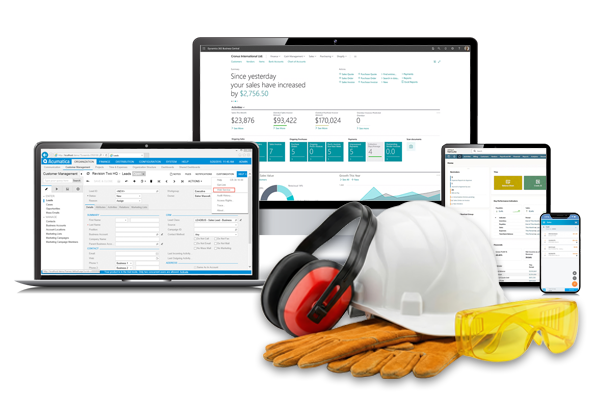COMPARISON | 4 MIN READ
Dynamics 365 Business Central vs. QuickBooks
Compare the affordability and flexibility of these two solutions

Microsoft Dynamics 365 Business Central and QuickBooks Enterprise are two leading business solutions with overlapping features and functions. While these products share some capabilities, several key differences may make one a better fit for your business than the other. In this article we will be comparing the similarities and differences. If you want a side-by-side report, unlock our Dynamics 365 Business Central vs. QuickBooks Comparison Report.
Accounting vs. ERP Software
Features
Business Central Core Features:
- Finance Management
- Sales & Marketing
- Sales & Delivery
- Purchasing & Payables
- Inventory
- Supply Planning & Availability
- Project Management
- Warehouse Management
QuickBooks Enterprise Core Features:
- General Ledger
- Accounts Payable
- Accounts Receivable
- Inventory Management
- Pricing
- Reporting
- Hosting
- Field Service Management
- Order Management
- Job Costing
Suppose you’re eager to explore additional core and advanced module features offered by Business Central and QuickBooks. In that case, our comparison report is the perfect resource for you. Explore a detailed side-by-side comparison report.
Pricing
Implementation Timeline
The amount of time needed to implement these solutions will be unique to your business depending on your needs, the modules you choose to implement, and any additional customizations or integrations that are part of your implementation project. QuickBooks Enterprise is generally faster to implement, with many companies fully up and running within 1.5 to 2 months. Its out-of-the-box functionality and simplified setup make it ideal for small businesses that need a quick transition.
Business Central, on the other hand, typically takes 3 to 6 months to implement. While the longer timeline reflects the system’s broader capabilities and configuration flexibility, it also ensures that your solution is tailored to your specific processes, departments, and reporting needs. For growing companies with complex operations, that extra implementation time can be well worth the investment.Regardless of the platform, working with an experienced partner can help ensure your project stays on track.
Integrations
As your business grows, the ability to connect your accounting software with other systems becomes increasingly important. QuickBooks Enterprise offers integrations with many popular third-party apps, including payroll providers, e-commerce platforms, and CRM tools. These plug-and-play integrations work well for smaller businesses with straightforward needs and help extend the functionality of QuickBooks without requiring a major IT investment.
Dynamics 365 Business Central, however, is built to support more advanced integration scenarios. As part of the broader Microsoft ecosystem, it connects natively with tools like Outlook, Excel, Power BI, and Microsoft Teams. For businesses using Microsoft 365 or Dynamics 365 Sales (CRM), this level of integration creates a seamless flow of data across departments. Business Central also supports APIs for custom integrations, making it a powerful choice for companies that rely on specialized industry tools or need to connect data from multiple sources. If your goal is to unify systems across finance, sales, inventory, and operations, Business Central delivers more out-of-the-box flexibility and long-term potential.
Sum It Up
QuickBooks Enterprise is an ideal solution for small businesses with basic accounting and operational needs. It may not have all the bells and whistles of bigger solutions on the market, but QuickBooks Enterprise is a cost-effective, easy-to-use option for organizations without the time or resources for lengthy customization and implementation processes. The solution’s open API lets it integrate with best-in-class software.
Microsoft Dynamics 365 Business Central is a solution built to scale alongside your business. Small and mid-sized businesses can benefit from its ERP functionality, including out-of-the-box inventory management, supply planning, and warehouse management. Microsoft’s Dynamics 365 solutions integrate seamlessly with software across Microsoft’s platform like Microsoft 365 and the Power Platform.
At Cargas, our expert consulting team specializes in ERP and financial management solutions, including Business Central. We were even one of the first Microsoft partners to begin implementing Business Central! If you’re struggling to determine which of these solutions is the best fit for your business, we’d love to help. Let’s connect to talk about your needs and what you’re looking for in a software solution.
Business Central vs. QuickBooks Comparison Report

Take advantage of our side-by-side comparison report by entering your information: ►

Let’s Chat
Still have questions? Get in touch with our expert team of software professionals.


